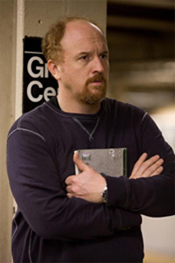In the pilot episode of Louie, which recently started its third season on FX (Thursdays, 10:30/9:30c), Louis C.K. appears onstage at a comedy club: “I think a lot of people who think they’re good people are living a really evil life without thinking about it.” He continues: “There are people who just starve to death, and that’s all they ever did. There’s people who are born and they go ‘Oh, I’m hungry,’ then they just die, and that’s all they ever got to do. And meanwhile I’m in my car having a great time, and I sleep like a baby.”

It’s a common thread running throughout Louis C.K.’s work—namely, the question of how to be a good person in a superficial and self-absorbed world, and how to recognize and respect the humanity of the other. Most importantly, as a comedian, he never exempts himself from criticism—in fact, he is most often its object. In a first season episode, Louie‘s title character tells of picking up a friend’s rural cousin from the Port Authority; it’s a story that exposes a form of inhumanity so pervasive as to be mundane:
“We pass this homeless guy and she sees him. I mean we all passed him but she saw him. She’s the only one who actually saw him. We didn’t. Me and her cousin were like, ‘Um, so? He’s supposed to be there. So what?’ … She goes [to the homeless man], ‘Oh my God, sir, are you OK?’ We immediately go to her, ‘Oh no, no, no, honey, don’t.’ We start correcting her behavior like she’s doing something wrong. She’s like, ‘Why, is he OK?’ ‘No, no, he needs you desperately. That’s not the point. We just don’t do that here. Silly country girl.'”
Louis and Louie have been lauded by TV critics and fellow comedians for this humaneness, deftly addressing a range of complex topics from bullying, child neglect, terrorism, and suicide to race relations, sexuality, and religion. Indeed, after his series premiered, many questioned whether Louie was really a comedy or whether it would be more accurately described as something quite different. There are occasional dramatic segments intended to elicit few if any laughs, but these often represent the series at its best, offering penetrating analyses of human nature and experience that are at once both critical and sympathetic. In an episode called “Bully,” Louie is threatened and humiliated in front of his date by a teenage boy. He then follows the kid all the way to Staten Island and confronts his parents—only to witness the bully’s dad beat the boy in response. Though Louie protests the father’s violence, the episode ends with the two men sitting on the front stoop having an earnest conversation about the challenges of fatherhood.
The series regularly tackles religion too. In an episode titled “God,” there’s a fairly serious segment in which a 10-year-old Louie clowns around with a classmate during a lesson about the Passion, leading his teacher to fear that she has failed to adequately convey Jesus’ suffering. She gathers the children in the chapel and brings in a local doctor to do the job right. The doctor undertakes a “theoretical autopsy” of the murder victim, Jesus. His intense postmortem holds the children spellbound, and he ends by inviting Louie and his friend up front to reenact the scene. The children fall silent when he instructs Louie to drive a nail into his friend’s wrist. Louie refuses. The doctor goads him and asks, “You can’t do it? Well then, why’d you do it to him? You drove in his nails with your sins … and you won’t nail them into this brat, this godless boy?”
That night, Louie is plagued by dreams of his past misdeeds. He wakes up in a sweat, grabs a pair of pliers, and runs to the church where he approaches the statue of Jesus on the cross, confessing his guilt and yelling desperately, “I’m sorry! I’m sorry!” He removes the nails and crown of thorns and sits holding the statue in a pose that evokes the Pieta, whispering “it’s all right” in an effort to soothe the dying Christ. Louie’s mother is called to pick him up from the church and, once in the car, she reveals her unbelief. “So, there’s no God?” he asks. “I don’t know, Louie. I don’t. All I know is that you have to be good to people whether there is or there isn’t. You have to take that on yourself.” The segment ends with the image of an apathetic maintenance man sent to repair the statue, who indifferently smokes a cigarette while he nails the man to the cross once more. Scenes like these, though often controversial, engage religious questions with a complexity rarely found on television today, especially TV comedy.
Still, C.K., whose “everything’s amazing and nobody’s happy” bit on Conan O’Brien’s show gained popularity in Christian circles, has received complaints from those who were disappointed in his other material and his TV series, as he explains in an interview on NPR’s Fresh Air.
“When these people would write to me, I kind of liked them. So whenever I’ve encountered a Christian saying, ‘Why don’t you stop talking like that so I can hear you?’, I think, Well you’re the one putting the earmuffs on, but I wish you could hear me because I like you … There’s been a lot of vilification of right-wing people. It’s really easy to just say, ‘Ah, you’re Christian, and you’re anti-this and that, and I hate you, and you should just go away.’ But to me, it’s more interesting to find out, What is this kind of person like and how do they really think? Do I have any common ground with people like that who find me really, really offensive? So the episode about the Christian girl was like that.”
Ah, the “episode about the Christian girl.” In that one, Louie meets Ellen Farber, leader of a fictional Christian “anti-masturbation group.” After first lashing out at her, he and Ellen go for a stroll together. She rolls with laughter at his graphic report of the embarrassment and humiliation that accompanied his first sexual experience, and she then makes her surprisingly winsome pitch for “purity.” Louie now appears the debased fool by comparison—and here, Louis C.K. once again turns his critical comedic sensibility on himself. In short, rather than simplistically portraying Ellen as an “extremist” or “fanatic,” the show presents a well-formed character, whose point of view Louie comes to respect, even if he vigorously disagrees. As a comedy, Louie is as much about masturbation and fart jokes (sometimes both at once) as it is about larger social problems. But even here, the humor serves as a meditation on human relationships and mutual understanding.
Louis C.K. has seen his share of controversy lately, and many find his raw brand of comedy offensive. Certainly, his FX series is not for everyone. But for those brave enough to go along for the ride, Louie will yield candid insights into the contemporary experience – and quite a few laughs to boot.
Jessica DeCou recently earned her Ph.D. in theology at the University of Chicago Divinity School, where her research included Theology of Culture/Popular Culture.
© 2012 Christianity Today. All rights reserved. Click for reprint information.











